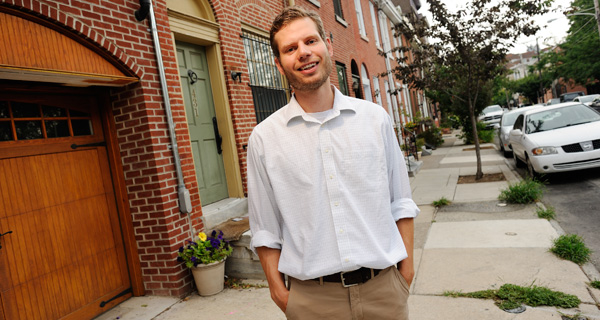story by
Shaun Brady |
photo by
Albert Lee
Undoubtedly, the biggest barrier to improving home energy efficiency is cost, but a secondary hindrance is a lack of knowledge. The EnergyWorks Select Partnership Program is working to address both these obstacles by allowing community, civic and faith-based groups to pool together and benefit from group discounts on home efficiency audits, as well as provide a group setting for solving problems.
Since the program began about a year ago, eight partnerships have formed, including neighborhood groups from University City and Queen Village, and co-ops like Weaver’s Way and the Energy Co-op. “We’ve found that the partnerships take a little more time to nurture,” says Tanya Morris, director of communications and outreach for the ECA. “But the reward at the end is greater because of the impact that it has on the community as a whole.”
There is no minimum number of households required to qualify for a partnership. (“We want it to be more than two,” Morris says with a laugh.) The program is loosely defined, but essentially matches the community groups with a building analyst and contractor who can recommend improvements at a discounted price—as little as $150—since several area homes can be visited in a single day.
Further rebates are offered after a certain number of improvements are completed, and low-interest loans are available for improvement work.
Working closely with these groups, says Morris, helps spread the ECA’s mission to reach more people through local leaders. “Having strong leadership in these partnerships allows us to keep pushing this sustainable agenda and making an impact on our community.”
Queen Village
Even before joining the Select Partnership Program, Queen Village residents were already being encouraged to improve their energy efficiency by a neighbor. Clay Bedwell, a member of the Queen Village Neighbors Association’s (QVNA) Sustainability Committee, was using his website, paenergy.org, to educate his neighbors on energy efficiency. The Select Partnership Program developed as an extension of that work.
“While I’ve had some success over the internet, we were looking for ways to engage a more localized group of people,” says Bedwell. “We really wanted to educate the community. And offer an excellent value, so the partnership was a way to creatively problem-solve convincing people to get audits.”
The QVNA arranges group purchases of energy audits on a seasonal basis—ideally twice yearly in the spring and fall. They have contracted with auditor Jeff Lane, president of Star Energy Solutions of Fort Washington. In the fall of 2011, there were 14 audits. Four of those homes continued with contracted improvements. This spring, eight audits were completed, but no repair work so far.
“The people who go full-bore have already seen a drastic change in how their house performs as well as their overall comfort and energy performance,” says Bedwell. “People with newer homes have had minor improvements, while others have just had the audit done to give them a road map for what to do in the future. Awareness is the first step for us.”
Queen Village is a perfect fit for the program, explains Bedwell, because of its architecture and the environmental awareness of its residents. “We have a lot of old rowhomes that by nature are efficient because they abut each other, but they’re also inefficient because they have a lot of old windows and cracks in the masonry and so on. Many older houses lack modern insulation technology and have old appliances. So we have a great framework—it’s just a matter of making positive changes in that direction.”
University City District
Although University City District (UCD) joined the program less than a year ago, the community is already the most successful in the program. Thirty-six residents have undergone audits, and six have followed up with home improvements.
“I’d love to increase that number,” says Seth Budick, UCD’s manager of policy and research. “But it’s valuable just to have the audit, because there’s a lot of stuff that you learn there about basic behavioral things that you can change—caulking for drafts, smaller-scale improvements.”
The program was advertised in the UCD’s bi-weekly newsletter and the University City Review, as well as through social media outlets and on a small West Philadelphia radio station. The results have been impressive.
“Our best performer saw a 27 percent reduction in the leakiness of their house as a result,” says Budick. “The average house in the area was found to be 3.86 times as leaky as the target number, while the worst was 5.49 times. When houses were designed in the 19th century, a certain amount of leakiness was intentional to release carbon monoxide fuels from burning coal, so some of that is by design, but there’s definitely room for improvement.”
Budick is still brainstorming ways to encourage residents to take advantage of the discounted audits offered by Lowry EcoSolutions on the Main Line. The audits are only part of UCD’s broader push for sustainability initiatives.
“Our mission is really about quality of life,” says Budick. “Helping residents to reduce energy costs is a component of that. We look for opportunities where we can bring the power of the crowd and use our reach in this neighborhood to collectivize the demand and thereby encourage more people to participate. Of course, we’re also interested in sustainability as a pure environmental goal on its own because we want University City to have that value attached to it. We have plenty of residents and institutions who are totally committed to that.”
To learn more about Select Partnerships and to start one in your community, visit


